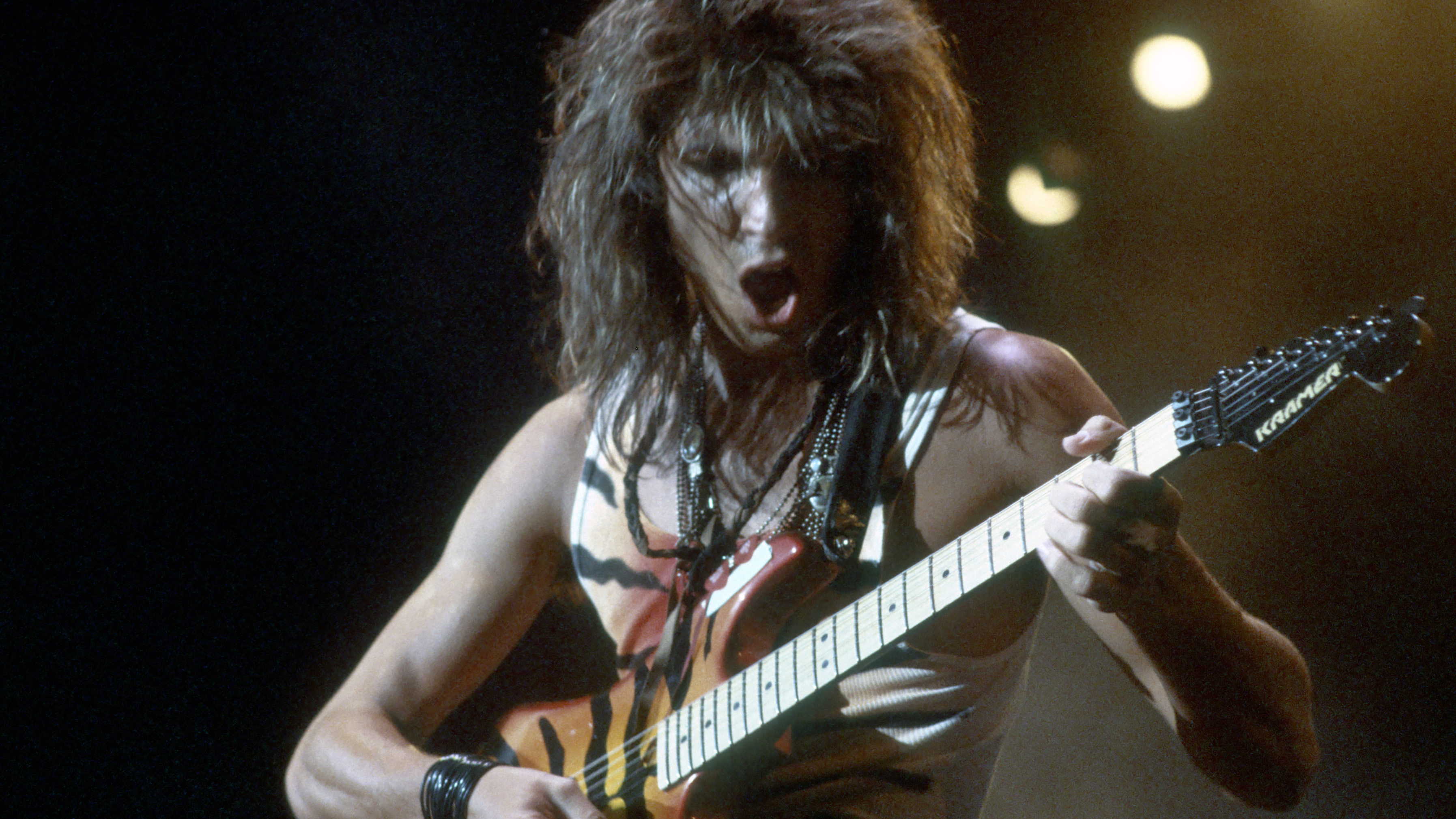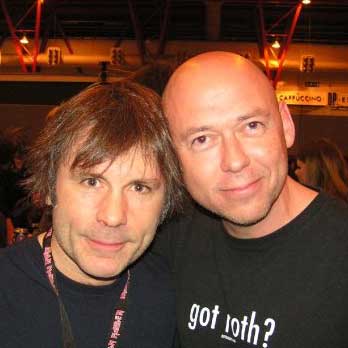“I remember Eddie Van Halen asking me, ‘What’s wrong with you? Where’s that fire, dude?’ But I didn’t want to explain it to him”: George Lynch, the guitar hero who connected with EVH but got burned by Ozzy Osbourne
He almost got the gig to replace Randy Rhoads

George Lynch became famous in the ’80s as one of the greatest rock guitarists of his generation, starring in multiplatinum band Dokken.
But Lynch has also had some crushing setbacks in his career – kicked in the teeth by Ozzy Osbourne, Kiss star Gene Simmons, German hard rockers Scorpions… and by the singer who became his nemesis, Don Dokken.
In a 2019 interview with Rock Candy magazine, Lynch spoke about his most memorable experiences from his early years – beginning with his first contact with Eddie Van Halen at a club in Los Angeles in the late '70s.
“I remember one night I went to see Harvey Mandel, the guitarist in Canned Heat, at the Starwood,” Lynch said. “Eddie Van Halen was there too. Harvey was doing a solo where he incorporated two-hand tapping, and I think that influenced both of us.”
Lynch was in a band named The Boyz with future Dokken drummer Mick Brown when he came into Van Halen’s orbit again.
This was at a time when Gene Simmons was planning to launch his own record label.
“The Boyz played a show at Gazzari’s with The Runaways, and Gene was there,” Lynch recalled. “Gene told me he liked the band. We said to come and see us at the Starwood later that week.
Want all the hottest music and gear news, reviews, deals, features and more, direct to your inbox? Sign up here.
“Unfortunately, we were opening up for Van Halen, who were hot as balls. We weren’t bad, but we didn’t have a great night. We didn’t have a frontman like David Lee Roth and I’m not Eddie.
“We had our hopes up that night, thinking something might happen, but after the show we were alone in our dressing room going, ‘Where’s everybody at?’ We thought Gene would pop in.
“Then we heard: ‘Everybody’s down the hall in Van Halen’s dressing room. That’s where the party is.’
“I stuck my head in and there’s Dave with two champagne bottles, people dancing on tables, and Gene is making deals.”
Simmons ended up producing the demo recordings by Van Halen that led to their contract with Warner Brothers records.
Lynch said of that night at the Starwood: “I skulked back to our dressing room to lick my wounds and come up with a new plan. I guess it was a good learning experience.”
Another sobering experience for Lynch came in 1981, when he was in Germany recording the first Dokken album, Breaking The Chains.
In the same studio, Germany’s premier rock act, Scorpions, were working on the album Blackout, which would be their breakthrough hit in the US.
“We were doing our record in the basement,” Lynch explained, “and the Scorpions were upstairs in the big room doing their big record.”
Lynch claimed that he taught Scorpions lead guitarist Matthias Jabs a few tricks during that time.
As he recalled it: “Matthias was on me quite a bit. ‘Show me that thing you do – that California rock lick.’ Or, ‘What is this thing that Eddie Van Halen does?’ I’d show him stuff. I was ignorant. But whatever – I probably stole it all from somewhere.”
In the following year a huge opportunity slipped through Lynch’s fingers.
On 19 March 1982, Ozzy Osbourne’s guitarist Randy Rhoads died in a freak flying accident during a US tour.
In the wake of this tragedy, Osbourne continued to tour – initially with ex-Gillan guitarist Bernie Tormé and then with Night Ranger’s Brad Gillis.
But Osbourne need a permanent replacement for Rhoads, and Lynch was briefly in pole position for the job.
He revealed: “Before Randy Rhoads got the Ozzy gig I was just a name in a hat. I was approached but I never played an audition then.
“After Randy died, I spent a month around Ozzy. I flew to England and I’d be in the wings of the stage during his shows, and I’d jam at soundchecks.
“Then we got to Dallas and did some rehearsals with [bassist] Don Costa and [drummer] Tommy Aldridge. I was learning the songs, just tightening it up, and then one day Ozzy and Sharon came in.
“I don’t think Ozzy even sang anything, but I remember Sharon didn’t like my guitar. It was green and black, and she nicknamed it The Booger. And Ozzy had a problem with my short hair – and at that time, he was bald!
“Eventually we got to Hollywood, and they said they had a couple more guitar players they wanted to check out, one guy in particular. They said they felt obligated to look at them because they’d promised they would.
“And one night, I showed up near the end of the auditions and there was Jake E. Lee.
“I found Ozzy in the backroom and he just kind of muttered, ‘Ah, we won’t be needing you. Thanks, bye!’ And that was the end of that.
“I was kind of expecting to be let down a little easier. And you know, how about a little severance pay for the whole month I quit my job? I had two little kids, I dedicated a month to this guy, he’s got millions of dollars, and I didn’t get a nickel.”
Lynch’s fortunes turned around when he rejoined Dokken. The band’s 1984 album Tooth And Nail was a big seller, and the follow-up Under Lock and Key was Dokken’s creative peak.
That album’s opening track Unchain The Night is peak George Lynch – with a killer riff and not one but two solos with a melodic finesse reminiscent of Michael Schenker.
“I loved what we did with Under Lock and Key,” Lynch said. “The sound of that album is so cool, and Unchain The Night is such a great track. Under Lock and Key was our first platinum record, and the best we ever made.”
However, for all the success the band had, there was something rotten at the core of Dokken – a bitter feud between Lynch and singer Don Dokken.
And that feud came to a head in 1988, when Dokken appeared on the Monsters Of Rock stadium tour alongside some familiar faces – Scorpions and Van Halen.
As Lynch claimed: “The difficulty for me was knowing that Don was planning to break the band up – and we were told all this before we went on the Monsters Of Rock tour.
“I was completely devastated. I do what I do out of passion and fire and conviction – all these positive things – and if you take that away, I’m just a guy playing the notes to get a paycheck.
“Before, I was trying to prove to the world that we were a tight band, that we were unique, and we were destined to make a mark in the musical universe – a band that would stand the test of time and get better and better.
“And when you take all that away, I had no incentive. So I was just standing up there in front of the biggest crowds we ever played in front of, and I was just going through the motions.
“I remember Eddie Van Halen asking me, ‘What’s wrong with you? Where’s that fire, dude?’ But I didn’t want to explain it to him.”
Within a year of the Monsters Of Rock tour, Dokken split.
Brief reunions have happened since then, but with George Lynch and Don Dokken nothing could ever last.
Lynch remained philosophical about the band when he considered its legacy.
“I’ll try to be as fair as possible," he said. “I don’t know that Don had a vision, and I don’t think he naturally was going to be the singer that we wanted him to be – that would have made the band as great as it could have been.
“But when the band was at its peak, Don was the best he ever was.
“That came from us all working together. And I’m not saying that in a derogatory way. It was the same for me. I was under a lot of pressure in that band, and it was what I needed to be the best that I could be.”

Paul Elliott has worked for leading music titles since 1985, including Sounds, Kerrang!, MOJO and Q. He is the author of several books including the first biography of Guns N’ Roses and the autobiography of bodyguard-to-the-stars Danny Francis. He has written liner notes for classic album reissues by artists such as Def Leppard, Thin Lizzy and Kiss. He lives in Bath - of which David Coverdale recently said: “How very Roman of you!”
You must confirm your public display name before commenting
Please logout and then login again, you will then be prompted to enter your display name.
